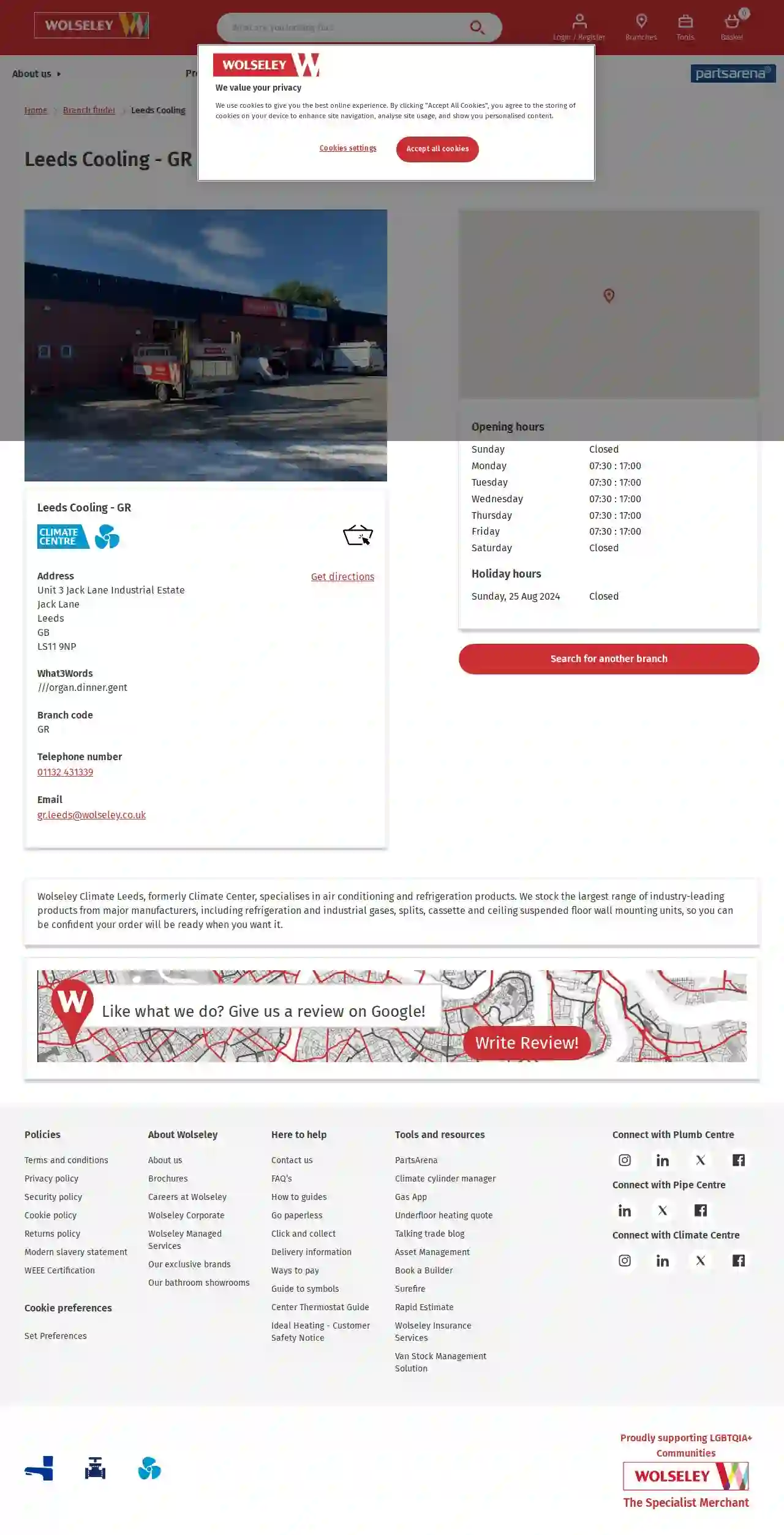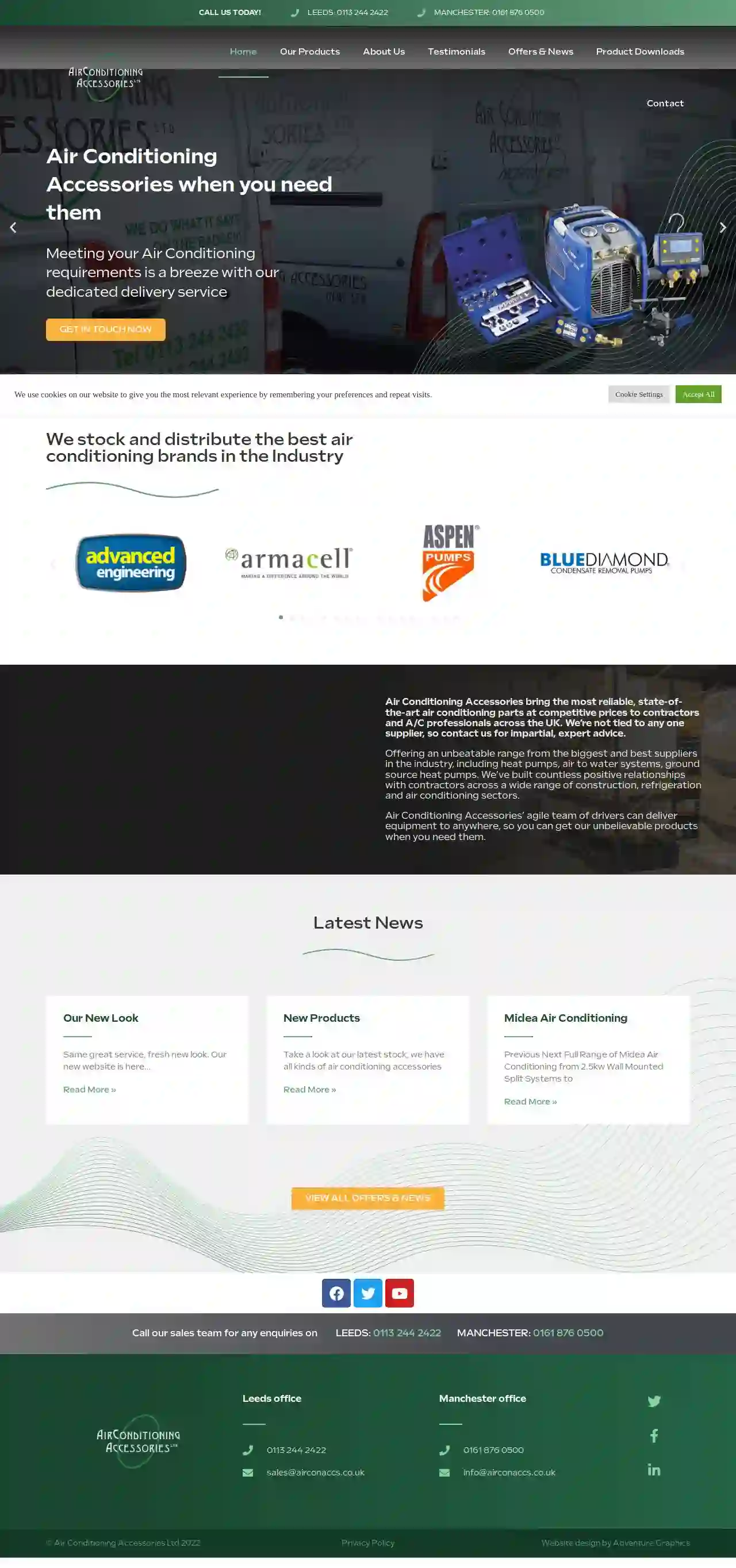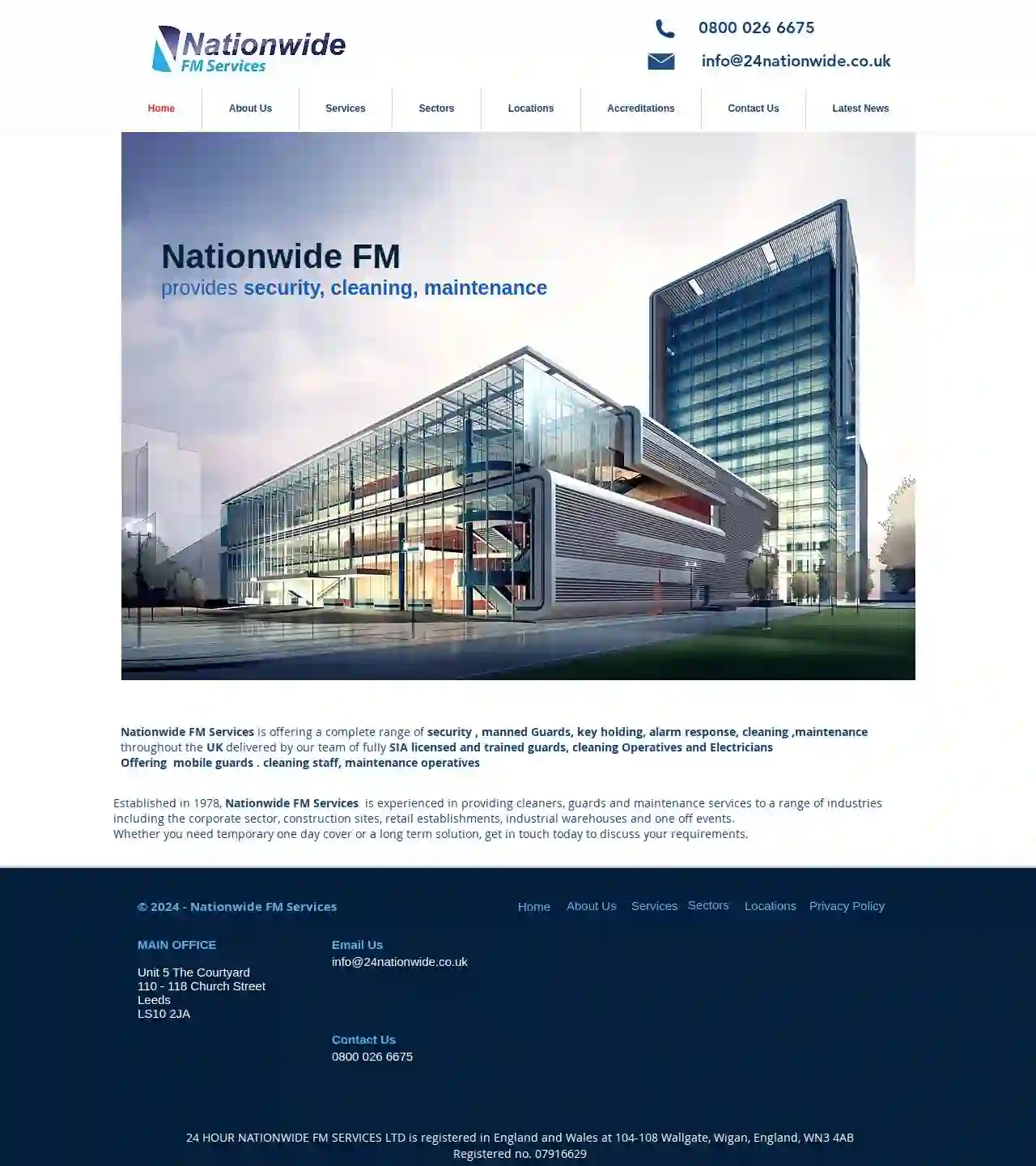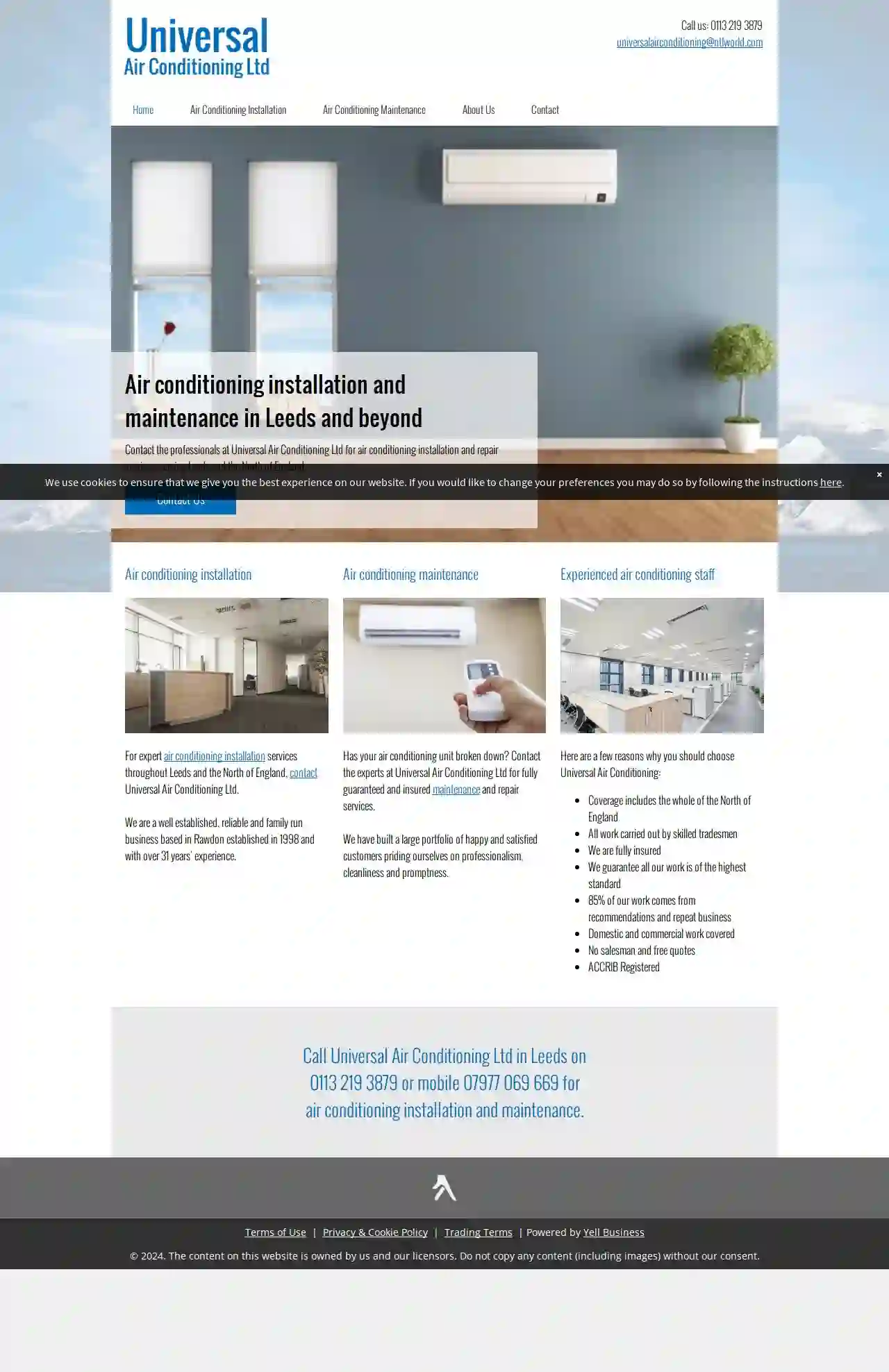Emergency HVAC Pudsey
Best After Hours HVAC in Pudsey
Receive 3 FREE Emergency AC Repair quotes for your project today! Compare profiles, reviews, accreditations, portfolio, etc... and choose the best offer.

Wolseley Climate
4.414 reviewsJack Lane, Unit 3 Jack Lane Industrial Estate, Leeds, LS11 9NP, GBWolseley Climate Leeds, formerly Climate Center, specialises in air conditioning and refrigeration products. We stock the largest range of industry-leading products from major manufacturers, including refrigeration and industrial gases, splits, cassette and ceiling suspended floor wall mounting units, so you can be confident your order will be ready when you want it.
- Services
- Why Us?
- Gallery
Get Quote
Trust Electric Heating
4.6190 reviewsUnit 12, Elmfield Business Park, Lotherton Way, Garforth, LS25 2JY, GBTrust Electric Heating is a family-owned business based in Leeds, UK, specializing in providing innovative, affordable, and sustainable electric heating solutions. They are renowned as the UK's Most Award-Winning Electric Heating Company, boasting a range of accolades including Most Innovative Domestic Electric Heating Provider, Heating Product Manufacturer of the Year, and Best Domestic Electric Heating Solutions Provider. Their flagship product, the NEOS Radiator, is a modern storage heater designed and manufactured in Britain, offering exceptional energy efficiency, slim design, and full controllability. Trust Electric Heating conducts rigorous research and development, collaborating with the University of Huddersfield to ensure their products deliver superior performance and longevity. They stand behind their commitment to quality with a 25-year guarantee, which is 2.5 times longer than their competitors. The company prides itself on its customer-centric approach, offering a personalized experience and transparent pricing. They cater to a wide range range of customers, including homeowners, businesses, architects, churches, and student accommodation. Trust Electric Heating is dedicated to providing exceptional service and support, ensuring complete peace of mind for their clients.
- Services
- Why Us?
- Accreditations
- Gallery
Get Quote
TD Cooling Services - Leeds
Unit 3, Europa Court, Dee View Boulevard, Chester, CH1 4NP, GBTDC is a company specialising in the design, installation and maintenance of Air Conditioning, Refrigeration and Ventilation systems. We provide these services to our customers throughout the UK, from our main offices based in Chester and Leeds. We work across many industry sectors, including Power generation, Aviation, Healthcare, Pharmaceutical, Schools and Construction. We have an extensive, and growing, client list ranging from large multinational companies to small local business. We aim to build a collaborative working relationship with our clients, customers and suppliers in order to deliver an excellent level of service.
- Services
- Why Us?
- Gallery
Get Quote
Air Conditioning Accessories Ltd
52 reviewsLeeds, GBAir Conditioning Accessories is a leading supplier of air conditioning parts and accessories in the UK. We stock and distribute the best air conditioning brands in the industry, offering an unbeatable range of products from the biggest and best suppliers. Our dedicated delivery service ensures that our products are delivered to anywhere in the UK, so you can get the equipment you need when you need it. With a team of experienced drivers and a wide range of products, we're the perfect partner for contractors and A/C professionals across the UK. Our products include heat pumps, air to water systems, ground source heat pumps, and more. We're not tied to any one supplier, so we can offer impartial, expert advice to help you find the right product for your needs. Whether you're a contractor, builder, or A/C professional, we're here to help you meet your air conditioning requirements with ease.
- Services
- Why Us?
- Gallery
Get Quote
Horsforth Heating Solutions Ltd
4.975 reviewsHorsforth, Leeds, 123A New Road Side, LS18 4QD, GBHorsforth Heating Solutions Ltd is a professional heating and plumbing services provider with over 14 years of experience. We offer boiler installation, service, and repair services across Bramhope, Horsforth, Harewood, Headingley, Leeds, North Leeds, Roundhay, and Scarcroft. Our team of Gas Safe registered heating engineers is dedicated to providing high-quality services and ensuring customer satisfaction. We are a Worcester Accredited Installer and can offer up to 12-year guarantees on selected Worcester Bosch boilers. We are also a Worcester Service Partner, authorized to repair boilers while they are under their guarantee. Our company is accredited and monitored by several trade and industry bodies, ensuring our customers receive a high standard of workmanship and professionalism.
- Services
- Why Us?
- Accreditations
- Our Team
- Gallery
Get Quote
Morris & Spottiswood Limited
52 reviews54 Helen Street, Glasgow, G51 3HQ, GBMorris & Spottiswood is a leading provider of fitout, refurbishment, M&E, facilities management, and construction services in the UK. With a proud track record of excellence, we aim high, act responsibly, and value our staff and customers. We create environments in which people can thrive, both in terms of the work we do and the type of company we are. Our commitment to going the extra mile for our clients, offering the best solutions, and adding value every step of the way sets us apart. We operate throughout the UK, with a network of offices and local delivery teams, and have an annual turnover of over £100m.
- Services
- Why Us?
- Gallery
Get Quote
Calverley Control Installations Ltd
54 reviewsRoyds Close, Blacup House, Leeds, LS12 6LL, GBWith over 25 years of experience in Building Management Systems, Calverley Control Installations are ideally placed to provide design, manufacturing, installation and software engineering to suit the requirements of the most demanding projects. We pride ourselves in our ability to deliver a high quality control solution from initial concept through to final handover and training. We operate an open and honest policy with all our clients as we like to think that a client is for life and not just for one project. Year Established: 2003 Projects Completed: 57 Control Panels created: 365 Projects a year: 285
- Services
- Why Us?
- Testimonials
- Gallery
Get Quote
ICH Services
4.522 reviewsRoker Lane, Union Bridge Works, LS28 9LE, GBICH Services provide hard facilities services throughout the United Kingdom. Through management of all types of mechanical maintenance, ICH Services are able to offer complete peace of mind for a single building to a multi property estate. ICH have a proven track record being different to their competitors. Being maintenance led validates their unique obsession with client care. ICH strive to develop long term relationships with all clients, and this year celebrate 29 years in business.
- Services
- Why Us?
- Gallery
Get Quote
Nationwide FM Services
3.125 reviews110 - 118 Church Street, Unit 5 The Courtyard, Leeds, LS10 2JA, GBNationwide FM Services is a company that provides security, cleaning, and maintenance services throughout the UK. Established in 1978, they have experience serving a range of industries, including corporate, construction, retail, industrial, and events. They offer both temporary and long-term solutions, with a team of fully SIA licensed and trained guards, cleaning operatives, and electricians. Their services include mobile guards, cleaning staff, and maintenance operatives. Nationwide FM Services is committed to delivering a complete range of security, manned guarding, key holding, alarm response, cleaning, and maintenance services.
- Services
- Why Us?
- Gallery
Get Quote
Universal Air Conditioning Ltd
Winnona3 Benton Park Avenue, Rawdon, LS19 6LZ, GBUniversal Air Conditioning Ltd is a reliable, family-run business established in 1998 with over 31 years of experience in the air conditioning trade. We pride ourselves on professionalism and delivering the best results. We offer air conditioning repair and installation services throughout Leeds and the North of England. Why choose Universal Air Conditioning Ltd? * Fully insured and guaranteed services * Domestic and commercial air conditioning installations * ACCRIB registered * No salesmen * Skilled tradesmen * Free quotes We are Daikin D1 Partners and Mitsubishi Business Partners.
- Services
- Why Us?
- Accreditations
- Gallery
Get Quote
Over 12,692+ HVAC Contractors onboarded
Our HVAC experts operate in Pudsey and beyond!
HVACCompaniesHub has curated and vetted Top HVAC Businesses near Pudsey. Find a reliable contractor today.
Frequently Asked Questions About Emergency HVAC Services
- Lower Your Thermostat: Set your thermostat to a lower temperature when you are away or asleep. Consider installing a smart thermostat for precise temperature control.
- Seal Air Leaks: Seal gaps and cracks around windows, doors, and other openings to prevent heat loss.
- Improve Insulation: Make sure your home is properly insulated.
- Annual Furnace Maintenance: Annual servicing ensures your system is functioning optimally.
- Use Window Coverings: Close curtains or blinds at night to retain heat.
What is carbon monoxide, and how can it affect my HVAC system?
What is the best way to heat my home efficiently?
Are emergency HVAC services more expensive?
What is a smart thermostat, and how can it save me money?
What is carbon monoxide, and how can it affect my HVAC system?
What is the best way to heat my home efficiently?
- Lower Your Thermostat: Set your thermostat to a lower temperature when you are away or asleep. Programmable thermostats automate this process, helping you save money.
- Seal Air Leaks: Seal gaps and cracks around windows, doors, and other openings to prevent heat loss.
- Improve Insulation: Make sure your home is properly insulated.
- Annual Furnace Maintenance: Keep your furnace running efficiently with annual inspections and tune-ups.
- Use Window Coverings: Close curtains or blinds at night to retain heat.